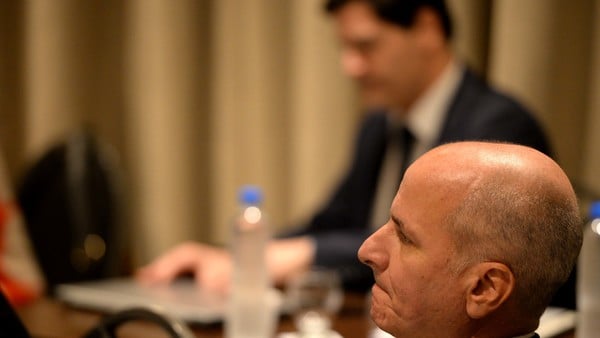Global Courant 2023-04-17 14:01:17
Six votes are necessary to dismiss a Buenos Aires judicial official. Six out of eleven. Half plus one of the members of the Jury for the Prosecution of Officials and Magistrates of the Province of Buenos Aires. In that account, races are played and the tolerance limits of the system are measured for behaviors that are sometimes fouls, sometimes crimes and sometimes both.
After eight years of procedures and delays, this Monday, April 17, at 5:00 p.m. in La Plata, the prosecutor of San Isidro Claudio Scapolan (52) will hear the verdict on his conduct in the framework of accusations of corruption and poor performance in its functions.
The jury can dismiss or acquit him by restoring him to the same position from which he was suspended in December 2022 with a reduction of 40% of his salary.
Before this measure, Scapolan enjoyed a forced license imposed in mid-2020 when Judge Sandra Arroyo Salgado and prosecutor Fernando Domínguez raided his office.
Jury to the prosecutor Claudio Scapolan, in the Annex of the Buenos Aires Senate, in La Plata. Photo Mauricio Nievas.
Due to the institutional seriousness of the case, this Monday’s verdict will be a pivotal moment, and not only for Scapolan.
His political trial is tied to a criminal investigation that uncovered a system of setting up cases, drug theft, and extortion of drug traffickers in the territory of San Isidro. That case, from which Arroyo Salgado was removed by the Chamber, remains in the hands of prosecutor Domínguez. He already has 32 people brought to trial, many of them high-ranking Buenos Aires police officers.
Within hours of the verdict, Clarín found out what will happen if the ruling is in his favor and what will happen if it is against. At least what can be seen on the surface.
If you are fired
The jury’s ruling, like any other, has a “resolution” part (verdict) that says if the person is guilty or innocent; and another part of “reasons” on which the court bases its decision. The sum of the verdict and the grounds is called “sentence” and what is expected on Monday is that, the decision and its grounds.
Why is it necessary to explain this? Because beyond the specific decision, each member of the jury can express their opinion on the grounds. That is to say that on Monday, in addition to “in” or “out”, it will be important to see the recitals to understand what position each of the 11 members of the Jury leaned towards.
Claudio Scapolan, in the jury. Photo Mauricio Nievas.
And in the case of Scapolan, the range of nuances is profuse and ranges from behavior inappropriate to his position to considering him a prosecutor who worked with corrupt police officers to operate in the drug market.
That said, if the jury -unanimously or by majority- decides to remove him, the prosecutor will be left with a long list of opportunities to claim via appeal: the first appeal is before the jury itself, which may or may not grant it. If he does not consider it admissible, Scapolan can go “complaint” to the Buenos Aires Supreme Court to review the jury’s decision.
In that instance the mechanisms are repeated.
The Court can open the appeal, analyze the merits of the matter, and agree or not. You can also consider it inadmissible, with what Scapolan has as his last letter: an appeal (or complaint) before the national Supreme Court.
All this usually takes years and runs separately from the criminal process in which the San Isidro prosecutor is not yet out of the woods.
Sandra Arroyo Salgado, at the first hearing. Photo Mauricio Nevas
When the federal judge of San Isidro Sandra Arroyo Salgado requested his dismissal, Scapolan was being prosecuted as head of an illegal association. Then the Chamber -in addition to removing the judge- only made firm the prosecution for ideological falsehood in the “Leones Blancos” case (the kidnapping in 2013 of half a ton of cocaine which, it is believed, was double but the Police stole 500 kilos).
As head of an “illicit association”, his privileges protected him from going to jail. Today the situation is different because the crime of “ideological falsehood” has a lesser sentence, which can be released. But be careful: in relation to the rest of the crimes, the Chamber did not dismiss it but rather dictated “lack of merit”, with which the danger of ending up behind bars receded but was not extinguished.
If they don’t fire him
If Claudio Scapolan achieves at least six votes in his favor, and he is not dismissed, the records indicate that he could immediately be put back in office.
What exactly this means is difficult to determine since he was head of the UFI for Complex Crimes that was dissolved in December 2016.
Unless the jury says something specific, his job fate would be in the hands of San Isidro Attorney General John Broyad. A more than tense situation considering that his top boss and also that of Broyad -the attorney Julio Conte Grand- made a strong opinion asking for the dismissal.
Julio Conte Grand, Buenos Aires attorney.
But the thing would not end there.
Since Scapolan had a 40 percent cut in his salary since December of last year, he would be fully entitled to claim a good amount of retroactive money. What is said applause, medal and kiss.
EMJ








